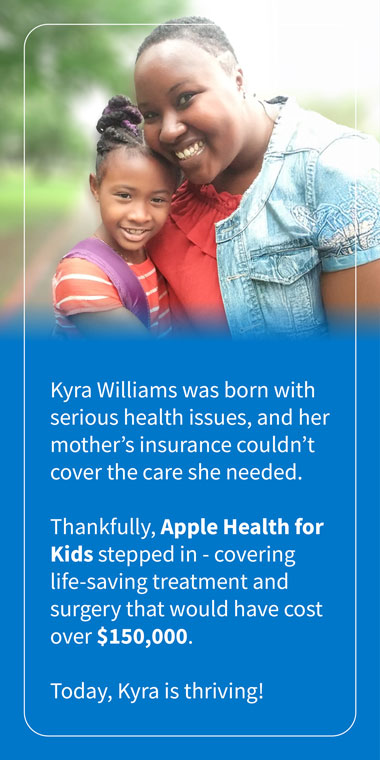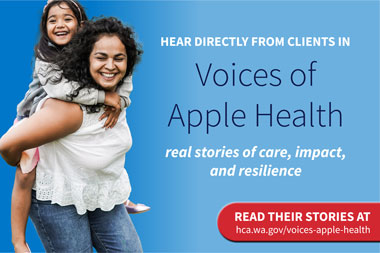To recognize Medicaid’s 60th anniversary on July 30, we asked a few staff at the Washington State Health Care Authority (HCA) to reflect on its legacy in Washington.
They shared deep pride in Washington’s work to expand care for people with low incomes, improve mental health and substance use disorder treatment services, and build one of the nation’s strongest long-term care programs. They spoke about the importance of supportive leadership, a compassionate workforce, and increasing access to coverage for all Washington residents. To them, Medicaid isn’t just a program—it’s a lifeline that ensures equitable access to health care coverage and allows people to thrive.
"When I think back to the Rolodex and where we are now, the change is hard to fully comprehend. We have new ways to communicate, enabling more timely and effective connections ... along with countless medical advances-I could go on and on!"
- HCA Interim Director, MaryAnne Lindeblad
From vision to reality: The history of Medicaid
Discover how Washington has shaped Medicaid over six decades, steadily evolving the program, expanding access, and increasing its impact.
Laying the foundation: 1965-1989
On July 30, 1965, Medicaid and Medicare were created under Title XIX of the Social Security Act, giving coverage to low-income children, their caretakers, and individuals who are aged, blind, or living with a disability.
By 1987, the Basic Health Program (BHP) was established through the Health Care Access Act. BHP started as a pilot project to provide affordable health care coverage to low-income working adults who were over income for Medicaid.
One year later, in 1988, Washington took a bold leap forward by establishing what is now known as the Health Care Authority (HCA). Aiding in the transformation of Medicaid in Washington – referred to as Apple Health.
Growth and reform: 1990-2014

By 1990, federal legislation mandated Medicaid coverage for children ages six to eighteen years old.
Shortly after, in 1993, Washington made the Basic Health Plan permanent and enacted the Health Services Act, expanding coverage to all low-income adults and kids and promoting access through managed competition and employer mandate.
In 1996, the federal Health Insurance Portability and Accountability Act (HIPAA) established protection for health coverage and patient privacy. Followed by the creation of the Children’s Health Insurance Program (CHIP) in 1997.
In 2000, the Breast and Cervical Cancer Treatment and Prevention Act allowed states to offer Medicaid coverage to uninsured women. Under Governor Gregoire’s leadership, Washington designated HCA as the single state agency for Medicaid and CHIP in July 2011.
A pivotal moment came in 2014 when the Affordable Care Act (ACA) took full effect in Washington. One of the most impactful changes was Medicaid expansion, which allowed the state to cover low-income adults ages 19-64 without children who met income requirements. This program, known as Apple Health for Adults, dramatically increased access to health coverage for people who had previously been ineligible. Today, Apple Health for adults covers over 600,000 people.
Around the same time, Washington rebranded its Medicaid program as Washington Apple Health and launched Washington Healthplanfinder™ through the Washington Health Benefit Exchange. These efforts transformed how hundreds of thousands of Washingtonians access affordable health care.
The last decade: 2015 to today
Beginning in 2016, Washington rolled out integrated managed care (IMC). This provided physical and behavioral health (mental health and substance use disorder treatment services) to clients under one managed care plan. This continued to be implemented across the state by region, with full integration completed on January 1, 2020.
In 2017, Washington launched the Medicaid Transformation Project to improve health outcomes and integrate care through innovative, community-based solutions.
In 2020, during the COVID-19 pandemic, Medicaid played a vital role in Washington by ensuring continued access to care, supporting vulnerable populations, and providing emergency coverage during a time of crisis.

What Apple Health (Medicaid) means to Washington families
Medicaid has been a lifeline for Washington families by providing stability, access to care, and critical support during times of need.
Rose Horgdal, Medical Assistance Customer Service Center’s Deputy Section Manager at HCA, was reminded of Medicaid’s crucial role in ensuring access to essential care and medication when she supported a parent concerned about their disabled child’s transition to Apple Health for Adults. Rose is also a parent of a disabled child and deeply understood this parent’s concern. Fortunately, Rose was able to bring reassurance that coverage and services would continue uninterrupted, and there were resources for the parent to become an Authorized Representative to advocate for their child.
Hear directly from clients in Voices of Apple Health -- real stories of care, impact, and resilience. Read their stories.
Looking ahead: The future of Apple Health (Medicaid) in Washington
Washington’s Medicaid program has come a long way, from covering limited groups and young children to now serving nearly 2 million people statewide. This growth reflects the state’s deep commitment to expanding access, improving care, and advancing equity.
Dana Eklund, Deputy Section Manager of Medical Eligibility Determination Services at HCA, reflected on the progress in the eligibility and application process, highlighting:
- 24/7 self-service through an online application portal,
- Real-time eligibility results via Washington Healthplanfinder, and
- A person-first approach to customer service.
Looking ahead, Doctor Charissa Fotinos, HCA’s Medicaid Director, said her top priorities include implementing new federal requirements in ways that minimize coverage loss and reduce customer burden. She also emphasized the importance of continuing work with providers and health systems to reduce unnecessary administrative tasks, while exploring innovative ways to deliver care that support and prioritize access and quality without increasing costs.
As we mark 60 years of Medicaid, Washington remains focused on progress — shaping a future where coverage is stable, care is high-quality, and health equity is within reach for every Washingtonian.
Thank you to MaryAnne Lindeblad, Charissa Fotinos, Dana Eklund, and Rose Horgdal for reflecting on Medicaid’s impact over the years.

